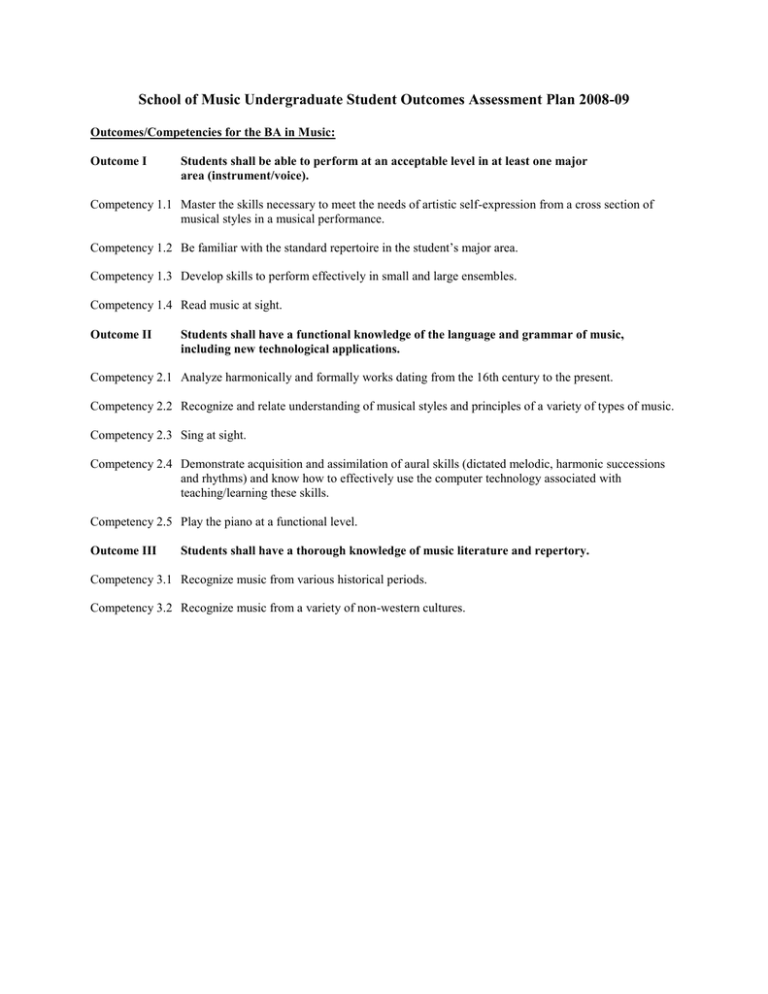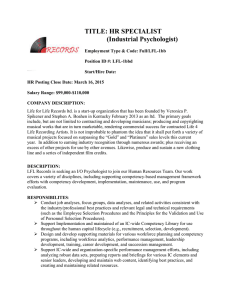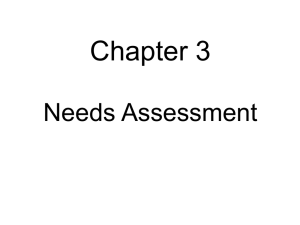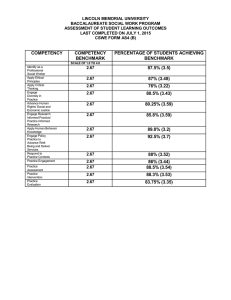School of Music Undergraduate Student Outcomes Assessment Plan 2008-09
advertisement

School of Music Undergraduate Student Outcomes Assessment Plan 2008-09 Outcomes/Competencies for the BA in Music: Outcome I Students shall be able to perform at an acceptable level in at least one major area (instrument/voice). Competency 1.1 Master the skills necessary to meet the needs of artistic self-expression from a cross section of musical styles in a musical performance. Competency 1.2 Be familiar with the standard repertoire in the student’s major area. Competency 1.3 Develop skills to perform effectively in small and large ensembles. Competency 1.4 Read music at sight. Outcome II Students shall have a functional knowledge of the language and grammar of music, including new technological applications. Competency 2.1 Analyze harmonically and formally works dating from the 16th century to the present. Competency 2.2 Recognize and relate understanding of musical styles and principles of a variety of types of music. Competency 2.3 Sing at sight. Competency 2.4 Demonstrate acquisition and assimilation of aural skills (dictated melodic, harmonic successions and rhythms) and know how to effectively use the computer technology associated with teaching/learning these skills. Competency 2.5 Play the piano at a functional level. Outcome III Students shall have a thorough knowledge of music literature and repertory. Competency 3.1 Recognize music from various historical periods. Competency 3.2 Recognize music from a variety of non-western cultures. Outcomes/Competencies for the B.M. in Performance: Outcome I Students shall be able to perform at an acceptable level in at least one major area (instrument/voice). Competency 1.1 Master the skills necessary to meet the needs of artistic self-expression from a cross section of musical styles in a musical performance. Competency 1.2 Be familiar with the standard repertoire in the student’s major area. Competency 1.3 Develop skills to perform effectively in small and large ensembles. Competency 1.4 Read music at sight. Outcome II Students shall have a functional knowledge of the language and grammar of music, including new technological applications. Competency 2.1 Analyze harmonically and formally works dating from the 16th century to the present. Competency 2.2 Recognize and relate understanding of musical styles and principles of a variety of types of music. Competency 2.3 Sing at sight. Competency 2.4 Demonstrate acquisition and assimilation of aural skills (dictated melodic, harmonic successions and rhythms) and know how to effectively use the computer technology associated with teaching/learning these skills. Outcome III Students shall have a thorough knowledge of music literature and repertory. Competency 3.1 Recognize music from various historical periods. Competency 3.2 Recognize music from a variety of non-western cultures. Outcome IV Students shall possess skills in Music Techniques that support their chosen major area. Competency 4.1 Rehearse and conduct a music ensemble typical of the student’s major performance area. Competency 4.2 Play the piano at a functional level. Outcomes/Competencies for the B.M. in Music Education: Outcome I Students shall be able to perform at an acceptable level in at least one major area (instrument/voice). Competency 1.1 Master the skills necessary to meet the needs of artistic self-expression from a cross section of musical styles in a musical performance. Competency 1.2 Be familiar with the standard repertoire in the student’s major area. Competency 1.3 Develop skills to perform effectively in small and large ensembles. Competency 1.4 Read music at sight. Outcome II Students shall have a functional knowledge of the language and grammar of music, including new technological applications. Competency 2.1 Analyze harmonically and formally works dating from the 16th century to the present. Competency 2.2 Recognize and relate understanding of musical styles and principles of a variety of types of music. Competency 2.3 Sing at sight. Competency 2.4 Demonstrate acquisition and assimilation of aural skills (dictated melodic, harmonic successions and rhythms) and know how to effectively use the computer technology associated with teaching/learning these skills. Outcome III Students shall have a thorough knowledge of music literature and repertory. Competency 3.1 Recognize music from various historical periods. Competency 3.2 Recognize music from a variety of non-western cultures. Outcome IV Students shall have the knowledge to teach most instrumental/vocal techniques of the band/choir/orchestra, and be able to rehearse and guide an ensemble to a public performance. Competency 4.1 Have a basic working knowledge of most instruments/voices. Competency 4.2 Create accurate and musically expressive performances as a conductor. Competency 4.3 Choose appropriate repertoire for the performing organization. Competency 4.4 Play the piano at a functional level. Outcome V Students shall have the knowledge needed to build a successful music program using the latest methods and technology. Competency 5.1 Know current methods and materials available in all fields and levels of music education, including new technology (computer applications). Competency 5.2 Exhibit potential to maintain positive relationships with colleagues and students. Competency 5.3 Be able to assess aptitudes, experiential backgrounds, and interests of individuals and groups of students and devise learning experiences to meet these needs. Competency 5.4 Be able to successfully express self through oral and written communication, including the use of recent technology (e-mail, internet, etc.). Outcome VI Students shall exhibit the potential to inspire others and to excite the imagination of students, engendering a respect and desire for music and musical experiences. Competency 6.1 Exhibit a positive outlook in regard to educating students about music. Competency 6.2 Create the opportunities which lead to further inquiries by students into the world of music. Competency 6.3 Understand the music education major’s own relationship to music and teaching music. Outcomes/Competencies for the B.M. in Composition/Theory: Outcome I Students shall be able to compose for diverse media in a creative and original manner. Competency 1.1 Master the skills necessary to meet the needs of artistic self-expression under a variety of conditions. Competency 1.2 Be familiar with the standard repertoire from all musical periods. Competency 1.3 Acquire a thorough technique of orchestration. Competency 1.4 Be familiar with, and have a working knowledge of, current music technology. Competency 1.5 Be familiar with styles of music outside of the Western art and popular music traditions. Competency 1.6 Be familiar with music publishing standards of musical notation and layout. Outcome II Students shall have a functional knowledge of the language and grammar of music. Competency 2.1 Recognize and relate understanding of musical styles and principles of a variety of types of music. Competency 2.2 Analyze formally works dating from the 14th century to the present. Competency 2.3 Be able to analyze the harmony, counterpoint, rhythm and/or sonic content of a given piece of music in a manner and approach appropriate to the style and historical basis of the piece. Competency 2.4 Sing at sight. Competency 2.5 Read different clefs and transposing instruments at sight. Competency 2.6 Demonstrate acquisition and assimilation of aural skills (dictation and tonal and atonal melodic segments; rhythms and meters, tonal and atonal counterpoint in 2 voices; tonal and atonal harmonies, alone and in progression, in 3 and 4 voices; phrase structure; formal unfolding; timbre). Outcome III Students shall have a thorough knowledge of music literature and repertory. Competency 3.1 Recognize music and composers from various historical periods. Competency 3.2 Recognize music from a variety of non-western cultures. Competency 3.3 Be able to understand and articulate historical continuity of diverse genres. Outcome IV Students shall possess skills in other musical and practical areas that support Composition. Competency 4.1 Play the piano at a functional level. Competency 4.2 Be able to organize performances, readings and/or recording of own compositions. Competency 4.3 Be able to publicize own performances. Competency 4.4 Be able to make use of electronic resources. Competency 4.5 Be aware of local, national and international resources, grants and competitions available to composers.






